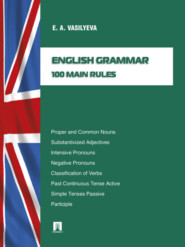скачать книгу бесплатно
This prettygirl is my sister.
What arethese strangeconclusions?
It'ssuch a wonderfullife.
It's alwaysthe same oldstory.
2) The demonstrative pronoun can also be used in place of nouns.
– Subject
Thismust not continue.
Thosewere the days.
– Object
Will you takethis?
Don't tell themthat.
Andrew can't work withthose.
RULE 22. Classification of Indefinite Pronouns
RULE 23. Some, Any and their Compounds
some
– statements
I needsomeinformation about language courses.
Someof the m istakes were silly.
– offers and suggestions
Would you likesometea?
Shall I bringsomerefreshments?
– requests
Where can I getsomepaper?
Could you give ussomeexamples?
any
– negative sentences
Olivia didn't knowanyof them.
It doesn't makeanysense.
– questions
Have you gotanyquestions?
Didanyof Andrew's friends call him?
– if-clauses
I can lend her my cell phone if there'sanyneed.
If you come acrossanyproblems, please, report us.
– statements
Contactanyof our assistants.
Anyanswer will do.
Somebodyphoned you ten minutes ago.
Would you likesomethingto eat?
Can we takesomethingto make notes on?
You may inviteanyone.
Are they waiting foranybody?
Andrew has not foundanything.
RULE 24. Each, Every, Either
each
– only with countable nouns
– refers to two or more things or persons that should be regarded separately and individually
There were cars parked oneachside of the street.
She kissedeachof her children.
– agrees with a singular verb
There are four apartments in our building.Eachof the apartments has its private entrance.
Eachitem was checked.
– However, if the pronoun each follows the plural subject, it agrees with the plural verb.
Theyeachdo their share of work.
I have two people in the office and weeachhave our own email.
every
– only with countable nouns
– refers either to indefinite number of things/persons or to a group of things/persons considered as a whole.
We could seeeverystar in the night sky.
Everyplayer in the team should cooperate.
– with modifiers such as nearly, almost, practically
Olivia knowsalmost everyneighbour.
Practically everyproblem has practical solutions.
– with time words such as minute, hour, day
There's a buseveryten minutes.
Everymorning Andrew goes jogging in the park.
– makes compound pronouns with – body, – one, – thing
Everybodylikes presents.
They invitedeveryonebut James and Karen.
Everything's done by computer nowadays.
Note
the pronoun everyone differs from the word combination every one.
Everyone is a synonym to everybody and refers only to persons.
Everyoneenjoyed the movie.
Every one is a synonym to each one and refers both to persons and things.
He watched a lot of movies and enjoyedevery one.
– agrees with singular verb
Everycitizen is obliged to observe the constitution.
Each andevery oneof us has their own opinion.
either
– with countable nouns
– refers to two or more things or persons
There are shops ateitherend of the street.
Eitherof these books is useful.
Nick can wear watches oneitherhand.
Note
the pronoun either differs from the adverb either, which is used in negative sentences.
If you don't order the dessert, I won'teither.
Olivia doesn't know his address, Andrew doesn't knoweither.
– agrees with a singular verb
Doeseitherof you speak Chinese?
Haseitherof you two seen Harry?
RULE 25. All, Both
all
– with uncountable nouns and plural countables
– has a generalized meaning
Allchildren need love.
Olivia said good buy to themall.
– the pronoun all agrees with plural verb if it's used with plural countables; if it refers to uncountable nouns, then pronoun all agrees with singular verb.
All the students wereready.
